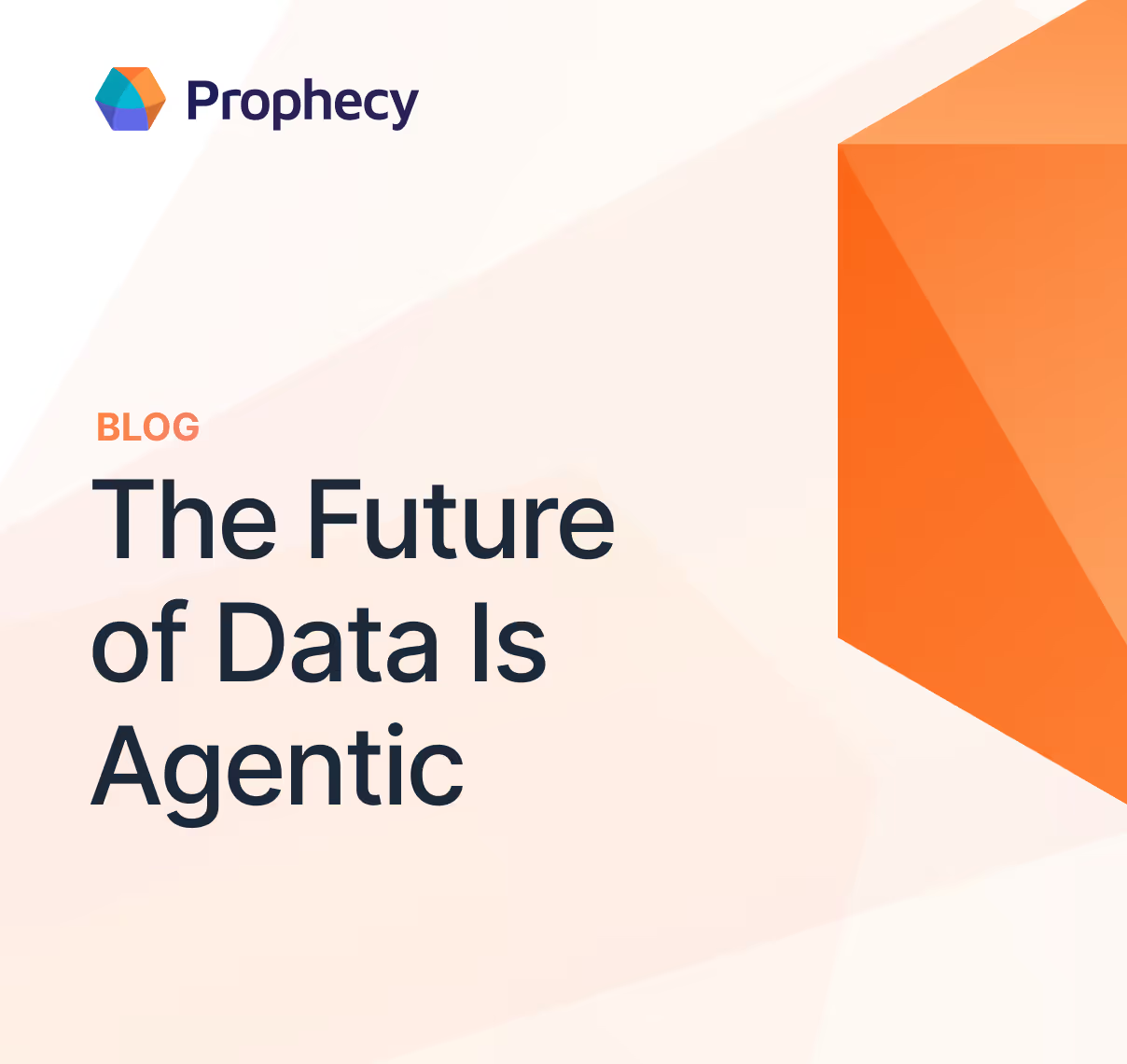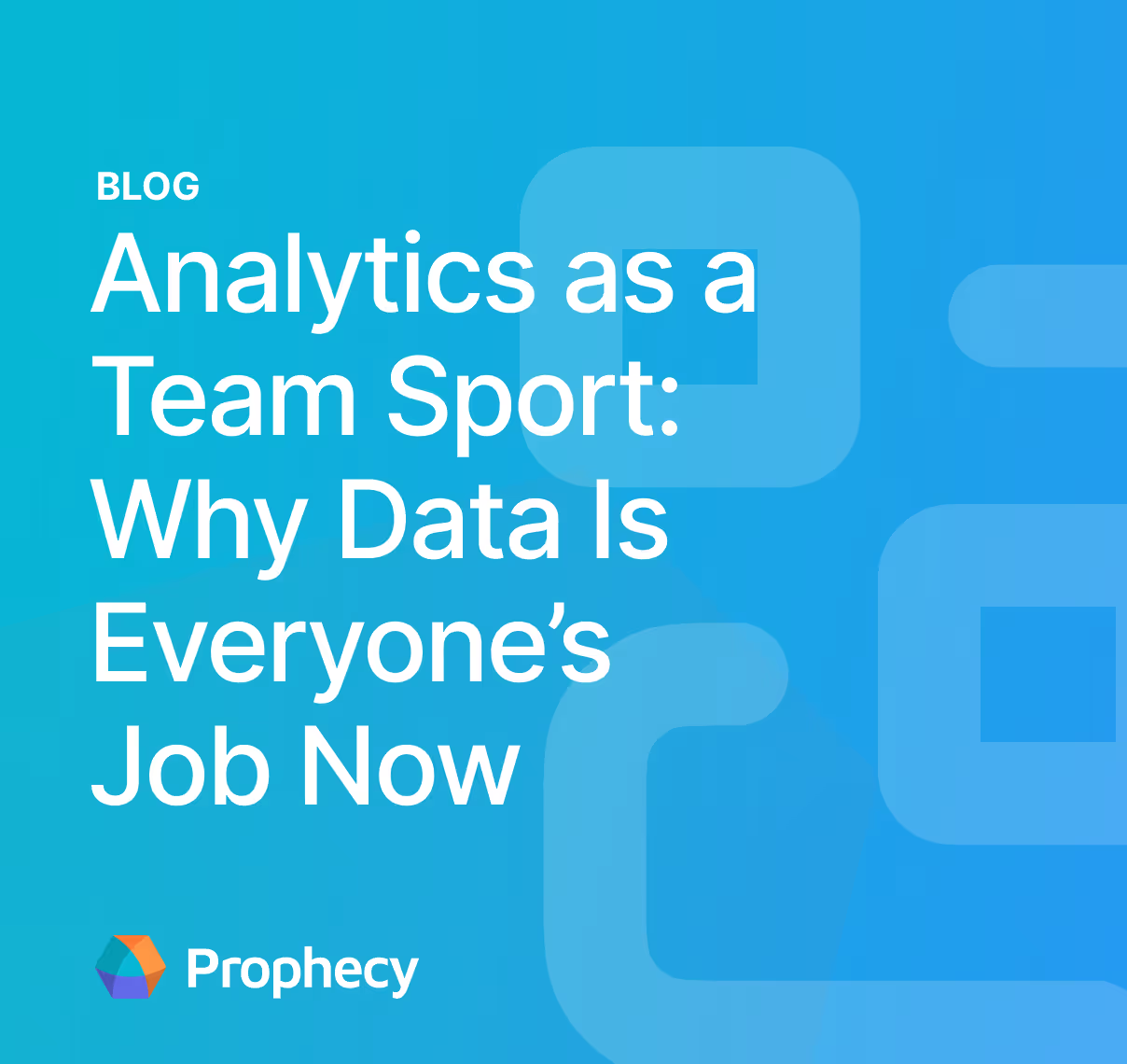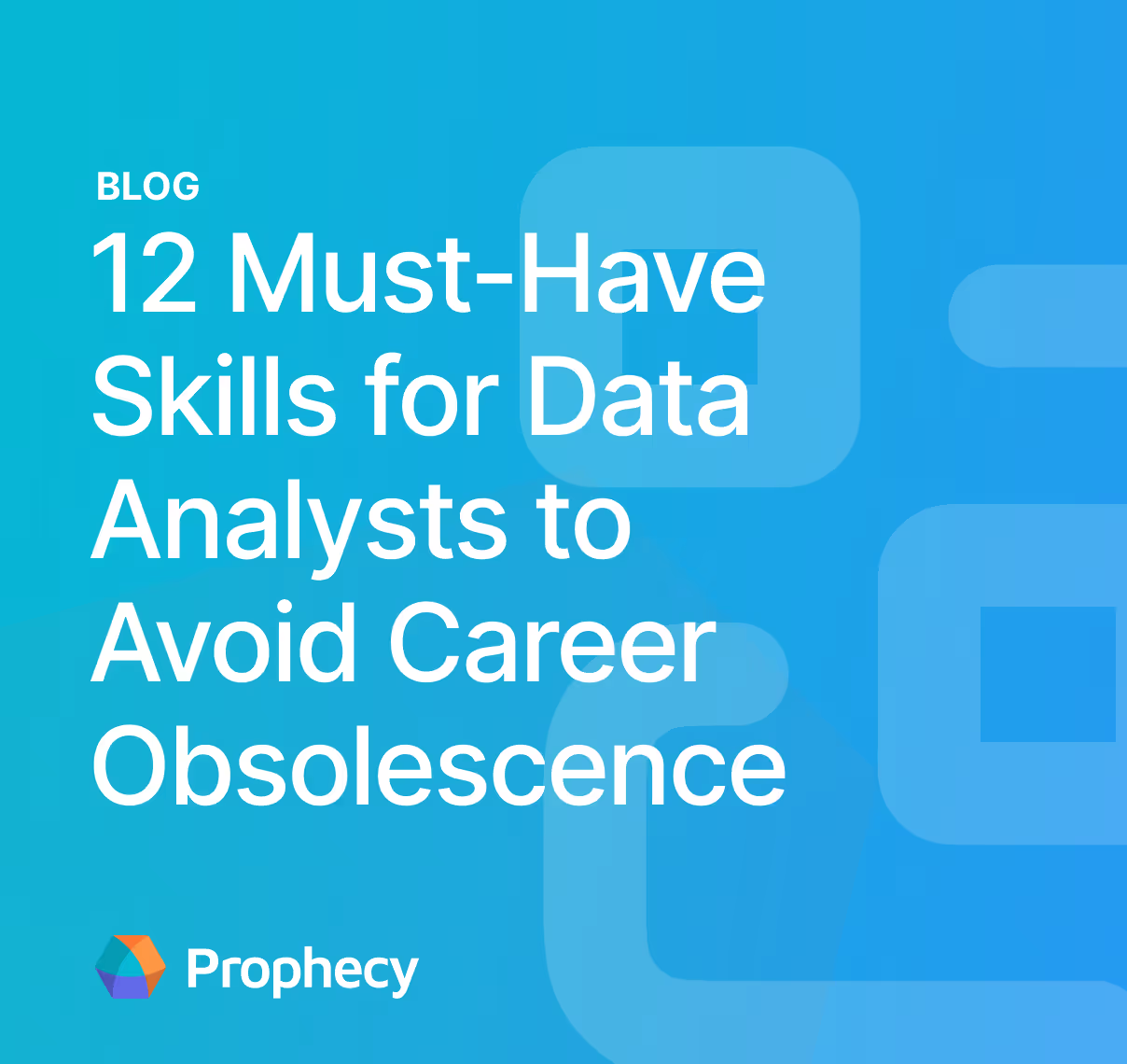Improve Data Engineering Team Productivity With AI Agents
Discover how AI agents can boost data engineering productivity by automating pipeline creation, data quality checks, and report generation.
If you're a data engineering leader, you know the drill. Your team is drowning in requests, spending most of their time on repetitive pipeline maintenance instead of building strategic capabilities. Meanwhile, business stakeholders are frustrated with month-long backlogs, and your talented engineers are burning out doing work that feels more like data plumbing than innovation.
AI agents are changing this situation entirely.
They're your new team members that never sleep, never get frustrated with repetitive tasks, and can handle the routine work that's been eating up your engineers' most productive hours.
How AI agents transform data engineering productivity
AI agents are revolutionizing every aspect of the data engineering workflow. From the initial pipeline design to ongoing monitoring and optimization, these intelligent assistants are eliminating bottlenecks and automating the repetitive tasks that have historically consumed your team's time.
Pipeline creation
Gone are the days when building a data pipeline meant weeks of manual coding and testing. AI agents can now analyze your data sources, understand your transformation requirements, and generate complete pipeline architectures in minutes rather than days. You describe what you need in plain English, such as "I need to pull customer data from Salesforce, clean it, and merge it with our transaction data," and the AI agent creates the entire workflow structure.
What makes this truly powerful is that these agents learn from your existing patterns and organizational standards. Instead of generic pipelines, they build pipelines that follow your team's conventions, use your preferred frameworks, and integrate seamlessly with your existing infrastructure. Your engineers can focus on the complex, business-critical logic while the AI handles the boilerplate and routine connections.
Data ingestion, transformation, and integration
Data ingestion used to be one of those tasks that seemed simple but always took longer than expected. AI agents excel at understanding data schemas, automatically detecting changes in source systems, and adapting ingestion processes without manual intervention. When your upstream systems add new fields or change data types, your AI agents adjust the pipelines automatically and alert your team to any potential issues. They can also optimize ingestion schedules based on source system patterns and downstream processing requirements, ensuring data flows efficiently without overwhelming your infrastructure.
The transformation layer is another place where AI agents really shine. They can analyze your business logic requirements and generate optimized transformation code that handles edge cases you might not have considered. More importantly, they can suggest improvements to existing transformations, identifying opportunities to reduce processing time or improve data quality. AI agents understand context and know when to apply specific business rules and how to handle missing data appropriately for different use cases.
With AI agents, data integration becomes less about managing dozens of different APIs and more about defining business rules that the AI agents execute reliably. These agents can automatically discover new data sources, understand their schemas, and suggest integration approaches based on your existing patterns.
Data orchestration and monitoring
Traditional data orchestration means babysitting workflows, manually adjusting schedules, and constantly firefighting when dependencies fail. AI agents transform this into a self-healing system that predicts issues before they impact your business users. They monitor data flow patterns, detect anomalies in processing times, and automatically adjust resource allocation based on workload demands.
Your monitoring setup becomes proactive, as AI agents provide intelligent notifications about potential issues with suggested remediation steps before problems occur. AI agents can also automatically retry failed jobs with optimized parameters, scale resources up or down based on data volume predictions, and even reroute processing through alternative paths when primary systems are under stress.
Data quality management
Data quality issues used to mean hours of detective work involving tracing through pipelines, examining logs, and manually validating data transformations. AI agents continuously monitor your data for quality issues, but they go beyond simple rule-based checks. They learn what "normal" looks like for your datasets and flag anomalies that traditional validation rules would miss.
These agents also fix many problems automatically. When they detect formatting inconsistencies, missing values, or data drift, they apply learned corrections and document the changes for your review. Your data engineers spend less time on quality firefighting and more time on defining quality standards and business rules that the AI agents enforce consistently.
Reporting and insights
Creating reports and dashboards used to require significant back-and-forth between your data team and business stakeholders. AI agents can now generate initial report structures based on natural language requirements, populate them with relevant data, and even suggest visualizations that best represent the underlying patterns in your data.
The real breakthrough comes in automated insight generation. Your AI agents continuously analyze your data and surface trends, correlations, and anomalies that warrant attention. Business users receive intelligent, contextualized insights delivered automatically instead of waiting weeks for custom analysis. Your data engineers can focus on building the analytical frameworks instead of manually creating every report variant.
Code generation and optimization
Writing data processing code involves a lot of repetitive patterns, including connection handling, error management, logging, and testing frameworks. AI agents generate this boilerplate code automatically, ensuring it follows best practices and includes proper error handling from the start. They can also optimize existing code, suggesting performance improvements and identifying potential bottlenecks.
Code reviews become more strategic when AI agents handle the routine checks for syntax, security vulnerabilities, and performance anti-patterns. Your senior engineers can focus on architectural decisions and business logic validation instead of catching basic coding issues. The AI agents also generate comprehensive test suites, ensuring new code meets quality standards without manual test writing.
Productivity gains from AI agents
AI agents deliver measurable and dramatic improvements to data engineering productivity:
- Data quality improvements: Proactive monitoring and automatic correction dramatically reduce incidents, catching issues before they impact downstream systems and business users.
- Faster time-to-insight: Automated report generation and intelligent data discovery accelerate the journey from raw data to actionable insights, eliminating traditional bottlenecks.
- Reduced manual development: Standard pipeline creation and maintenance tasks that once consumed weeks now happen in hours, freeing engineers for strategic work.
- Fewer critical alerts: Predictive issue detection and auto-remediation prevent problems before they escalate, reducing middle-of-the-night emergency responses.
- Streamlined code reviews: Routine checks and standard pattern validation happen automatically, allowing engineers to focus on architectural and business logic decisions.
The importance of governance for reducing AI agent risk
Before you get too excited about deploying AI agents everywhere, let's talk about the elephant in the room: governance. AI agents are powerful, but without proper guardrails, they can create more problems than they solve. You need robust data governance frameworks that define what your AI agents can and cannot do.
This means establishing clear boundaries around data access, transformation logic, and decision-making authority. Your AI agents should operate within well-defined parameters. They can optimize query performance automatically, but major schema changes require human approval. They can suggest new data sources, but your governance team must validate data security policies.
The key is creating a governance structure that enables AI agent productivity while preventing unauthorized access or unintended data modifications that could impact compliance or business operations.
Give back more time to your data engineers with self-service data platforms
Here's the ultimate productivity multiplier: when you combine AI agents with self-service data platforms, you make your data engineers more productive and dramatically reduce the demand on their time. Business users can access, transform, and analyze data independently, with AI agents providing guidance and maintaining quality standards.
Your data engineers can finally focus on what they do best: building scalable architectures, optimizing performance, and creating innovative solutions that drive business value. Instead of fielding endless requests for routine data extracts and basic transformations, they're designing the intelligent systems that enable everyone in your organization to be more data-driven. You'll have happier engineers, faster business insights, and a data platform that scales with your organization's growing analytical needs.
Implement governed self-service and AI agents with Prophecy
Prophecy offers a unique approach to AI-powered data engineering that keeps humans firmly in the loop. Our platform combines AI agents with visual pipeline development to accelerate your team's work while maintaining the transparency and governance you need for production systems.
Here are some of the key features that make our platform an essential tool:
- Visual AI pipeline development: Prophecy's AI agents work transparently on a visual canvas, showing you every transformation step as they build your pipelines. You can see exactly what the AI is doing, click into any transformation to inspect its logic, and view the data at each stage.
- Natural language pipeline refinement: You can refine any pipeline step using plain English throughout the entire development process. Want to rename a column, filter rows differently, or update a join condition? Just describe what you need in natural language, and the AI agent responds immediately.
- Intelligent data discovery: The AI agent helps you find the right datasets across all your accessible sources using semantic search that goes beyond simple keyword matching. Once you've found candidate datasets, you can preview data, understand schema details, ask questions about any dataset, and compare options side-by-side.
- Iterative development with preview and restore: The platform includes powerful preview and restore capabilities that let you experiment confidently. You can instantly see the effects of any changes before committing them, explore different transformation approaches, and restore your work to any previous state in your development history.
AI agents can be an incredible tool in your toolkit, but without alignment across your teams, you're still likely to run into challenges. Learn what might be holding your teams back in our ebook, Five Dysfunctions of a Data Team.
Ready to give Prophecy a try?
You can create a free account and get full access to all features for 21 days. No credit card needed. Want more of a guided experience? Request a demo and we’ll walk you through how Prophecy can empower your entire data team with low-code ETL today.
Ready to see Prophecy in action?
Request a demo and we’ll walk you through how Prophecy’s AI-powered visual data pipelines and high-quality open source code empowers everyone to speed data transformation
Get started with the Low-code Data Transformation Platform
Meet with us at Gartner Data & Analytics Summit in Orlando March 11-13th. Schedule a live 1:1 demo at booth #600 with our team of low-code experts. Request a demo here.
Related content
A generative AI platform for private enterprise data
Introducing Prophecy Generative AI Platform and Data Copilot
Ready to start a free trial?
Lastest posts

The Future of Data Is Agentic: Key Insights from Our CDO Magazine Webinar

Analytics as a Team Sport: Why Data Is Everyone’s Job Now




